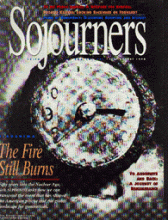FROM THE MOMENT I decided to journey to Auschwitz, my life changed completely. I have traveled all over the world, but whenever I thought about going to Auschwitz during the month before my departure, my heart jumped into my mouth. Irrationally, I prepared for death, writing a will and putting my affairs in order. My logical side said I was crazy. But as I thought about it, it dawned on me that for two million men, women, and children, "going to Auschwitz" was indeed a death sentence.
Packing was nearly unbearable. As I arranged my warm clothing, images appeared of scarecrows dressed in flannel pajamas standing for hours in the subzero climate. My body started to break out into odd aches and pains as if my subconscious was screaming for a way out.
I realized I was embarking on a pilgrimage. Auschwitz, for all its horror as the true hell on earth, is actually a sacred site; my five days there would be a Jewish version of the Stations of the Cross.
For one week in December 1994, 200 Christians, Jews, and Buddhists came from around the world to commemorate the Holocaust at the Convocation at Auschwitz. My catalyst for going was hearing that the last night of Hanukkah would be celebrated at the Auschwitz main gate, with its mocking inscription Arbeit Macht Frei (Work Makes One Free). This gate, along with the selection ramp and the gas chambers and crematories, are the indelible icons of the Holocaust, placing Auschwitz in another realm beyond the other Nazi camps, indeed beyond any other atrocity committed by humanity.
Read the Full Article

